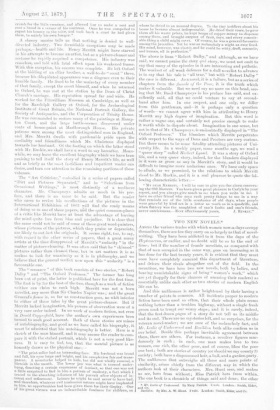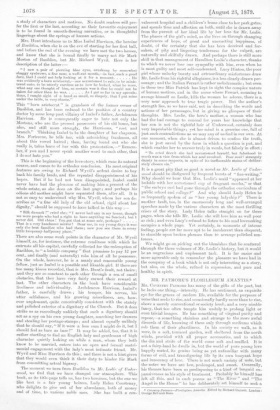TWO NEW NOVELS.*
AMONG the various trades with which women now-a-days occupy themselves, there are few they carry on so largely as that of novel- writing. They have been addicted to it from the days of the Heptemeron, or earlier, and no doubt will be so to the end of time ; but if the number of female novelists, as compared with that of men occupied in the same way, goes on increasing as it has done for the last twenty years, it is evident that they must soon have completely annexed this department of literature, and driven their rivals altogether out of the field. In the meantime, we have here two new novels, both by ladies, and bearing unmistakable signs of being " women's work," which are 3 at (happily for their chances of amusing their readers) as essentially unlike each other as two stories of modern English life can be.
And this unlikeness is rather heightened by their having a number of points in common. All incidents proper to modern fiction have been used so often, that their whole plain seems. nothing better than a trodden highway, without a single fresh green nook to tempt our weary steps ; and it is rarely, indeed, that the first dozen pages of a story do not tell us its middle• and its end. There are no mysteries left, and no surprises, for the veteran novel-reader ; we are sure of the melancholy fact, and Mr. Leslie of Underwood and Basildon both alike confirm us in our belief. Beside this perhaps inevitable agreement between them, there are others. For instance, a revolver figures mur- derously in each ; •in each, one man makes love to two women, one rich, the other poor, and of course, likes the poor one lest; both are stories of country (or should we Say county ?) society; both have a dispossessed heir, a ball, and a garden-party. The unlikeness that outweighs all these and more points of similarity, arises chiefly from the different way in which the authors look at their characters. Mrs. Hunt sees, and makes us see, hers from without ; Miss Patrick hers from within. The one book is a chronicle of things said and done ; the other • Mr. Leslie of Underwood- By Mary Patrick. 8 vols. London: Smith, Elder, and Co. Basildon. By Mrs. A. W. Hunt. 2 vole. London: Smith, Elder, and Co.
a study of characters and motive's. No doubt readers will pre- 'fer the first or the lust, according as their favourite enjoyment is to be found in smooth-flowing :narrative, or in thoughtful lingeriugs -about the springs of human actions, Mrs. Hunt introduces us to Miss Isabel Harrison, the heroine of Basildon, when she is on the eve of starting for her first ball, and before the end of the evening we have met the two heroes, and know that she is bound finally to marry not Sir Mark Morton of Basildon, but Mr. Richard Wyvil. Here is her description of the latter :-
" I saw a pair of piercing blue eyes, overhung by somewhat shaggy eyebrows, a fine nose, a well-cut mouth,—in fact, such a good
face, that I could not help looking at it for a moment was evidently a born aristocrat,—ono accustomed to rule, to be minis- tered unto, to be utterly careless as to how he looked, what he wore, -what any ono thought of him, so certain was it that he could not be
taken for other than he was As I got so far in my specula- tions, 1 caught sight of a hand so small, so shapely, that I put mine under the table, in very shame."
This "born aristocrat" is grandson of the former owner of Basildon, and has been reduced to the position of a country doctor by some long-past villainy of Isabel's father, Archdeacon Harrison. He is consequently eager to hate not only the Morton, who are the present possessors of his old home, but also, and still more strongly, the Harrieone, " root and branch." Thinking Isabel to be the daughter of her chaperon, Mrs. Fortescue, he tells her, with astouisbing frankness, all about this vowed hatred ; then, having found out who she really is, takes leave of her with this protestation,—" Remem- ber, if you and I never speak another word to each other, that I do not hate you."
This is the.begiuning of the love-story, which runs its natural course, and conies: o its orthodox conclusion. Its most original features are owing to Richard Wyvil's ardent desire to buy • back his family lauds, and the repeated disappointment of his hopes. But if he had not been disappointed, Isabel could never have had the pleasure of making him a present of the whole estate, as site does on the last page ; and perhaps his odious old mother snight have separated them, after all. It is not so easy to understand why 'Mrs. Wyvil, whom her son de- scribes as " a fine old lady of the old school, rigid about her dignity," should be supposed to have talked in this way :-
" Silk damask !" cried she; " I never had any in my house, though we were people who had a right to have anything we fancied; but I
never did, Old china! You got that at some sale, perhaps That is a very handsome mirror I Dear me, in my young days it was only the best fauiffies -who had them; now you see them in every little twopenny-halfpenny place."
There are also some weak points in the character of Mr. Wyvil himself, as, for Meta:ace, the extreme readiness with which he entrusts all his capital, carefully collected for the redemption of
Basildon, to " a bubble company " that promises to pay 12 per
cent., and -finally (and naturally) robs him of all he possesses. On the whole, however, he is a manly and reasonable young follow, just as Isabel is a possible and likeable girl. If there aro too many kisses recorded, that is Mrs. Hunt's fault, not theirs ; and they are so constant to each other through a sea of small
obstacles, that they have very fairly earned their reward at last. The other characters in the book have considerable liveliness and individuality. Archdeacon Harrison, Isabel's father, is carefully drawn ; his temper, his nerves, his utter selfishness, and his growing miserliness, are, how- ever unpleasant, quite conceivably consistent with the stately and polished exterior of a dignitary of the Church. But it does strike us as exceedingly unlikely that such a dignitary should net as a spy on his own young daughter, searching her drawers and stealing her postage-stamps ; and almost equally unlikely that he should say, "If it were a lees sum I might do it, but I should feel as bare as bare !" It may be added, too, that it is rather startling to find an English lady and gentleman of high character quietly looking on while a man, whom they both know to be married, enters into an open and formal matri- monial engagement with the lady's most intimate friend. Mr. Wyvil and Miss Harrison do this ; and there is not a hint given that they would even think it their duty to hinder Sir Mark from committing actual bigamy.
The moment we turn from Basildon to .21fr. Leslie of Under- wood, we find that we have changed our atmosphere. This book, as its title-page tells us, has two heroines, but the one we like best is a fair young heiress, Lady Helen Courtenay, who delights to give out of her abundance, both of money and of time, to various noble uses. She has built a CM-
valescent hospital and a children's home close to her park gates,
and spends time and affection on both, until she is drawn away from the pursuit of her ideal life by her love for Mr. Leslie. The phases of the girl's mind, as she lives on through changing
experiences of hope, of great and unexacting happiness, of doubt, of the certainty that she has been deceived and for-
saken, of pity and lingering tenderness for the culprit, are naturally and skilfully drawn. And perhaps there is still more
skill in that management of Hamilton Leslie's character, thanks to which we never lose our sympathy with him, even when he is most guilty and most self-condemned. Lucy Hinton, the poor girl whose unlucky beauty and extraordinary misfortunes draw Mr. Leslie from his rightful allegiance, is a less clearly-drawn per- sonage ; and the Italian Ferrari is rather melodramatic ; but even in these two Miss Patrick has kept in sight the complex nature of human motives, and in the scene where Ferrari, meaning to avenge himself on Leslie, kills the woman he adores, there is a very near approach to -true tragic power. But the author's strength lies, as we have said, not in describing the words and notions of her personages, but in giving us glimpses of their thoughts. Mrs. Leslie, the hero's mother, a woman who has had the bad courage to conceal for years her knowledge that her son is not the rightful heir of Underwood, certainly does very improbable things ; yet her mind is a genuine one, full of just such contradictions as we may any of us fiud in our own. At one moment, when she is almost driven to confess the truth, she is just saved by the form in which a question is put, and which enables her to answer truly in words, but falsely in effect
" To acted deceit she had accustomed herself, but falsehood in wards was a vice from which her soul revolted. Poor soul ! strangely dainty in some respects, in spite of its ineffaceable stains of deliber- ately chosen sin," It is a great pity that so good a novel as Mr. Leslie of Under- wood should he disfigured by frequent bursts of " fine-writing." Why should we hear that Mrs. Leslie's maid "appeared at her
bedside with her accustomed cup of fragrant mocha," or that " the embryo earl had gone through the orthodox curriculum of public school and college P" And why should Lady Helen be so frequently spoken of as " her young ladyship P" There is another fault, too, in the enormously long and well-arranged speeches made by the various characters at the most thrilling crises of the story. Lady Helen talks straight on for three pages, when she tells Mr. Leslie she will love him as well poor as rich ; and oven Lucy's refusal to listen to his mad lovemaking occupies a whole page. Yet certainly, in moments of intense 'feeling, people are far more apt to be incoherent than eloquent, to stumble upon broken phrases than to arrange polished sen- tences.
We might go on picking out the blemishes that lie, scattered through the three volumes of Mr. Leslie's history, but it would be an ungracious and unpleasant task. It is far easier and more agreeable only to remember the pleasure we have had in the company of a book which is not only interesting as a story, but also, ou the whole, refined in expression, and pure and healthy in spirit.































 Previous page
Previous page